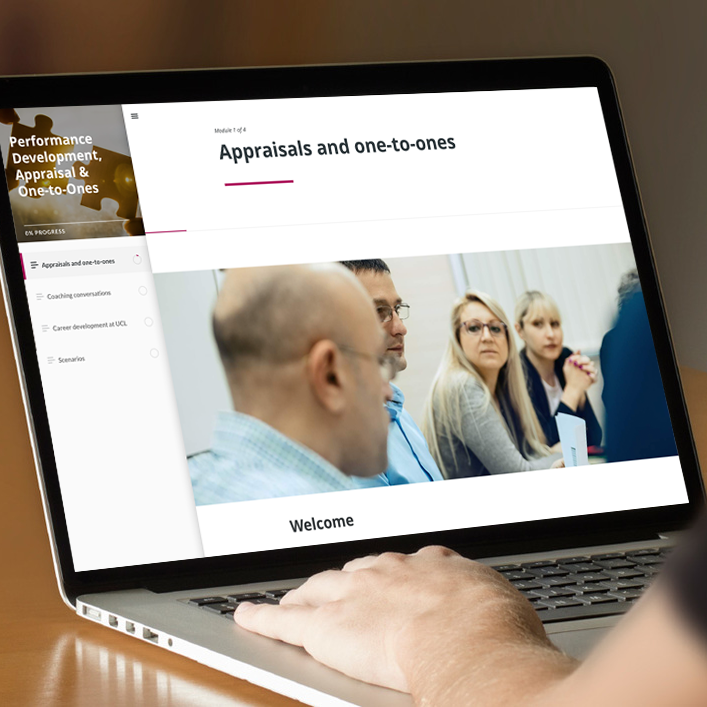
New Performance Development Training Course released in partnership with University College London
Marshall E-Learning Consultancy, the leading diversity and equality e-learning provider, today announces the launch of its Performance Development training course. Created in partnership with University College London (UCL), the course focuses on coaching conversations and career development.
Performance Development training is a highly topical area for most organisations. According to research firm Gallup, only 29% of employees agree that the performance reviews they receive are fair, and just 26% agree that they are accurate.
The Performance Development online package is a resource intended to be used in a blended learning course design and contains video content to breathe life into the subject in a creative and engaging way. Combining this audio-visual content filmed on the University’s campus, with tailored material for specific staff groups means the resource – is highly flexible without sacrificing the importance of the course’s messages.
Tash Khan-Davis, Organisational Development Consultant at University College London describes why appraisal training is needed for their staff:
“Appraisals and one-to-ones are designed to do a number of things, which include aligning people to a shared mission, coaching, personal and professional development. All of that has to be achieved in a very diverse organisational environment.”
“Any training needs to be tailored to specific staff groups and context in order to facilitate learning which will help reviewers and reviewees get the most from appraisal and one-to-one conversations.
“Through Marshall E-Learning, we can rapidly scale up and deliver training to our thousands of staff, enabling the content to be easily tailored to the local context.”
David Marshall, founder of Marshall E-Learning Consultancy, explains why universities and colleges have seen increased demand in running effective appraisals.
“With some academics growing weary of managerialism, and staff under increasing pressure in this higher education sector, the course provides guidance on how these vital conversations should be run so they are meaningful to all concerned.”
“Within the context of the contemporary workplace, many have said that the annual appraisal is no longer a viable practice, with typical staff members desiring more detailed guidance and feedback. We wanted to explore how organisations can move to a coaching model for these performance and development discussions. We also wanted to explore what these discussions look like in the distinctive higher education environment.”
The Performance Development and One-you-Ones training resource is split into four sections, covering the key aspects of appraisals and one-to-ones, focusing in on their importance with regard to goal setting, wellbeing and career development, together with some specific modules which promote organisational resources and frameworks.
For more information and a free demo please contact David Marshall on 0845 123 3909 or [email protected], or visit marshallelearning.com/e-learning-courses/coaching-performance-management/
About the Appraisals and One-to-Ones Course
Section One - Appraisals and One-to-Ones: Welcome
This section gives an overview of the course and outlines why staff engagements such as these are so important.
-
Why it matters, including staff motivation and work engagement
-
The appraisal conversation
-
Wellbeing
-
Goal setting
Section Two - Coaching Conversations
In this section the course explores the best practice for coaching conversations and the styles which are most effective.
-
The GROW model
-
The coaching spectrum
-
Coaching styles
Section Three - Career Development
Focusing on career development, within this section the course delves into the roles each staff member should be playing.
Section Four
The final part of the course uses nuanced video scenarios to visualise the topics explored earlier on and highlight the differences in effectiveness between the right and wrong approaches to appraisals and one-to-ones.
-
Scenario One: coaching-style conversation
-
Scenario Two: having a difficult conversation
For more information and a free demo please contact David Marshall on 0845 123 3909 or [email protected], or visit marshallelearning.com


